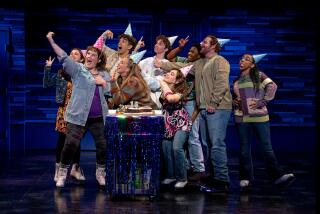Deaf Actress Interprets NoHo Role as Good Sign
- Share via
Antoinette Abbamonte flashes her dimples as she talks about her rage.
Thirty-year-old Abbamonte is currently in rehearsal for her Los Angeles stage debut as Gloria in Mark Stein’s comedy “At Long Last Leo” at North Hollywood’s Group Repertory Theatre.
Abbamonte has been in town only four months, and she has already snagged an agent and a lead in a NoHo play. But the rage is something she has always dealt with.
As Abbamonte explains, her eloquent fingers flying, she is deaf--as are her parents, her brother and a number of other relatives--and that sometimes makes life hard.
“I’m still angry about this,” Abbamonte says, using American Sign Language and an expressive personal vocabulary of smiles, grimaces and gestures.
“I go home. I cry. I write down in my journal, ‘Why me?’ ”
That done, she gets on with her life--trying to make it as an actress in Los Angeles; spending time with her boyfriend Brian Kapell, a fellow actor, at their home in Hermosa Beach; doing the hundreds of little chores that modern life requires.
A native of Brooklyn, Abbamonte says she first remembers acting as a child, when she would use every wile and stratagem to get her volatile parents to stop arguing.
“My parents fight because they’re deaf and Italian,” she explains, with a grin.
As a youngster, Abbamonte thought she could never make it as a performer.
“I wanted to be on ‘Charlie’s Angels,’ but I’d say to myself, ‘I can’t do it because I’m deaf.’ ”
That all changed when a cousin, also deaf, took her to see the play “Children of a Lesser God.” The play was written for, and starred, deaf actress Phyllis Frelich, who won a Tony for her performance. Marlee Matlin won an Oscar in the film version.
“I was like--wow!--a deaf person on stage--on Broadway,” recalls Abbamonte, who made her acting debut at 11 in a production of “The Sound of Music.”
The role of Gloria, Leo’s lawyer love in “At Long Last Leo,” was written for a hearing actress. But director Patricia Lee Willson thought using a deaf actress would give an added dimension to the part. A nonhearing Gloria who had managed to become a lawyer would be the very embodiment of hope actualized that so much of the play is about, Willson explains.
Most weekends the part of Gloria is played by GRT regular Jonna Ivin (the play opened Feb. 18). But when Abbamonte, as guest artist, takes over the role March 12 through 14 and March 19 through 21, she will put her own spin on it.
The most dramatic difference is that she will sign her lines, which will be spoken by a newly created character--her cat, Priscilla.
Played by Amelia Norfleet, the cat functions as the nerdy Gloria’s sensual alter ego (since Norfleet spends much of her time crawling around the stage, she has taken to wearing kneepads). Norfleet knew some American Sign Language when she took the part, and, as partners in bringing Gloria to life, the two women communicate easily and often.
“The first day we felt a bond,” says Abbamonte, as Norfleet sits across from her backstage, translating questions into sign and answers into spoken English.
The entire cast of the Abbamonte version of the play has learned to sign, with her help. And, for a benefit performance March 12 at 8 p.m., the show will feature two professional interpreters for the deaf, Delia D’Angelo and Trisha Zagha. Proceeds will go to Los Angeles’ House Ear Institute, which conducts research on hearing loss.
In Abbamonte’s view, both her fluency in sign (“the most expressive language”) and her rage at the oppression the deaf sometimes face have enhanced her acting ability. She especially values the rage.
“That makes me who I am,” she says.
Abbamonte has played roles as diverse as Queen Margaret in “Richard III” and Laura in “The Glass Menagerie.” She has taken her turn as Sarah in “Children of a Lesser God.” She studied at San Francisco’s prestigious American Conservatory Theatre and started an acting program there for deaf students. She has directed as well.
Even with such solid credentials, Abbamonte knows that deaf performers don’t get parts, especially parts written for hearing actors, unless someone in charge has the imagination to offer the role.
Abbamonte thanks director Willson for that.
“Not many people are like that,” Abbamonte says. “I feel grateful for the opportunity.”
More to Read
The biggest entertainment stories
Get our big stories about Hollywood, film, television, music, arts, culture and more right in your inbox as soon as they publish.
You may occasionally receive promotional content from the Los Angeles Times.










